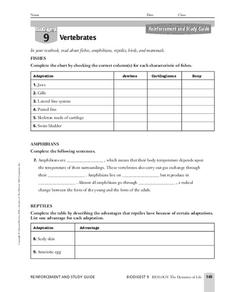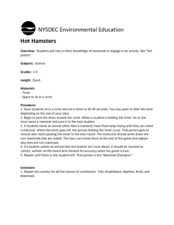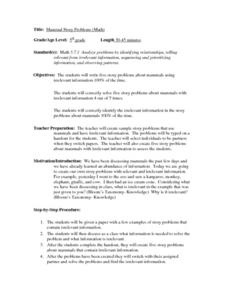Curated OER
Vertebrate Classification Challenge
Students determine which animals belong to the vertebrate phyla. In this classification lesson, students are given large papers with the names of the phyla of vertebrates. They must work together to place organisms into their...
Curated OER
Scientific Classification
In this scientific classification worksheet, students read about classification and the questions scientists ask in order to classify, then read about features of different classifications of animals. Worksheet is informational, no...
Curated OER
Sunken Millions Animals
This PowerPoint includes a game with ocean graphics in which two teams answer increasingly difficult questions about animals. Topics covered include plant and animal cells, animal adaptation, and similarities and differences between...
Curated OER
Classifying Vertebrates
Second graders study animal characteristics and classification. In this animal characteristics and classifications lesson, 2nd graders determine how to classify vertebrates which include mammals, reptiles, amphibians, birds, and fish....
Curated OER
Vertebrates
In this vertebrate instructional activity, students review the different adaptations for the 5 groups of vertebrates: birds, mammals, reptiles, amphibians, and fishes. This instructional activity has 12 matching, 1 fill in the blank, and...
Curated OER
United States Identifier
Fifth graders examine and research a major region of the Unites States in groups of four. In addition, they locate the states, capitals, mammals and two bodies of water or mountain ranges found within their region. After the research,...
Curated OER
Classifying Commercial Marine Species
Young scholars investigate taxonomy. They explore some of the commercial marine species caught in Magdalena Bay and develop a classification system for presented animals.
Curated OER
Biology In Elementary Schools
Young scholars classify animals into six major animal groups and describe the characteristics of the animals found within each group. In this living and non-living animals activity, students observe a variety of animals, both...
Curated OER
Organizing Life
In this taxonomy activity, students learn about Linnaeus' system for classifying living things. Students complete 2 fill in the blank and 2 short answer questions based on what they read.
Curated OER
Hot Hamsters
Using this quick activity, you can have your class review what they have learned about mammals. Learners sit in a circle, and take turns naming a mammal. This activity could be enriched by having learners go to their desks, identify a...
Curated OER
Kingdom Animalia ~ A Look at the Five Major Classes
Biological taxonomy masters examine the five main classes under phylum chordata. Pupils compare and contrast the identifying characteristics of the various organisms. They explain why taxonomy is important in classifying organisms. You...
Curated OER
Animal Classification
Students classify animals. In this animal classification lesson, students identify characteristics from each of the 5 categories of vertebrates. Students group animals by categories.
Curated OER
Classifying Animals
Second graders identify different types of animals on a two charts titled "Mammals" and "Not Mammals." They listen as the book, "They Call Me Wooly," by Keith DuQuette is read to them. Students are asked what is different about the...
Curated OER
Animal Classifications
Third graders work in small groups to investigate how to sort a variety of items into groups and subgroups. They work on a class chart based on the activity which show how the items are classified based on commonalities. Upon completion...
NOAA
Vertebrates II
Mammals of the ocean unite! Or not. The 20th installment of a 23-part NOAA Enrichment in Marine sciences and Oceanography (NEMO) program investigates how warm-blooded marine mammals survive in water. In the class activity, learners use...
Curated OER
Mammals And Reptiles
In this animal worksheet, 3rd graders study the aspects of the different animal classifications of mammals vs. reptiles. Students cut out 8 animals and paste them on the chart in the correct category.
Education Outside
Creature Jeopardy!
After conducting research on a given scientific animal name, group members take a walk around their school and look for the specified animals in that classification. Then, they come back to their worksheets and create five creative clues...
Curated OER
Draw Me a Mammal!
Fifth graders illustrate at least three art elements in a drawing of a mammal they've read about with 100% accuracy. As a review, Bloom's Taxonomy questions are asked as they prepare to sketch something they pictured in the story they read.
Curated OER
Mammal Story Problems (Math)
Fifth graders, after discussing the teacher's handout examples, practice writing five story problems about mammals using relevant/irrelevant information. As a class, they solve the story problems while identifying the key concepts that...
Curated OER
Animal Classes-Mammal Birds Fish Reptiles Amphibian
Young scholars learn about the characteristics of each animal classification. In this animal classification lesson plan students will first learn the characteristics of each classification. Then, they will find animals from given...
Curated OER
Name That Critter
Young learners classify five different animals into their proper category. The animals pictured are a pigeon, a lizard, a cat, a frog, and a goldfish. Pupils are also asked to tell why they know it's a certain kind of animal. An...
Cool Craniums
Rise to the head of the class. Using mammal skulls, groups of pupils identify aspects of them. The teams make predictions on the classification of mammal the skull belongs to based upon the observations.
Curated OER
Classifying into Categories
In this classification learning exercise, students organize their thoughts by classifying the words from the box into the following categories: birds, mammals, reptiles, and fish.
Curated OER
Animal Classification
In this animal classification worksheet, students will complete a graphic organizer by writing in the different animal groups: birds, mammals, reptiles, birds, and amphibians.























